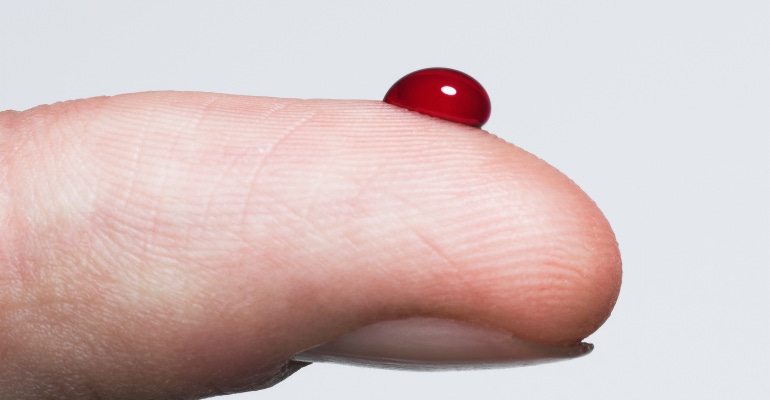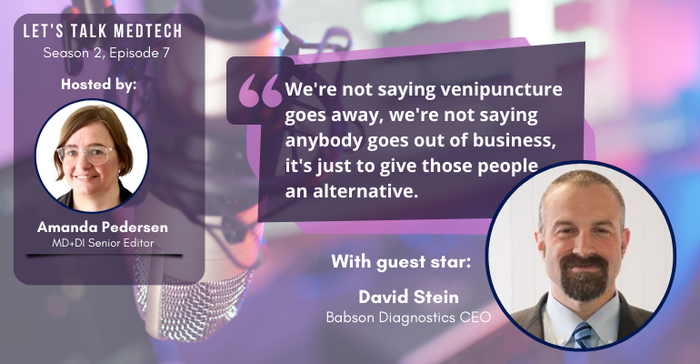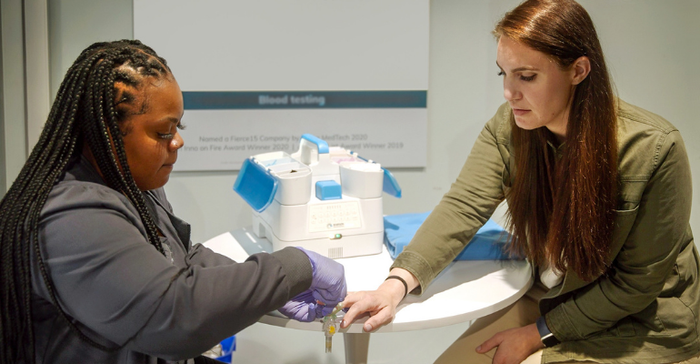Babson CEO David Stein drops by the Let's Talk Medtech studio with an update on the company's progress to reimagine diagnostic blood testing.
June 2, 2023

In the years since Elizabeth Holmes' fall from grace, we tend to focus on all the ways Theranos failed. But the defunct blood testing company did get one thing right: proving that people do want a better, more convenient way to get their blood tested.
Austin, TX-based Babson Diagnostics says it has developed a model for diagnostic blood testing that maintains a high standard of accuracy, yet requires only one-tenth the sample size of traditional venipuncture methods. Babson also uses a proprietary blood collection device to collect the sample at a participating pharmacy, then the sample is processed back at Babson's labs.

In this episode of Let's Talk Medtech, Babson Diagnostics CEO David Stein discusses the company's progress toward commercialization. He says the company has received positive feedback from participants in clinical studies who are excited about the potential for a better blood testing experience in the future. Stein talks about why innovation in blood testing matters from the perspective of payers, emphasizing that diagnostic blood testing empowers 70% of clinical decisions. Early detection of health issues through testing can lead to proactive interventions and cost savings for payers.

Season 2, Episode 7 Transcripts
David Stein: What to me is super exciting [is] when you see it in somebody's eyes when they experience it for the first time and they see that, boy, in the future there's a potential that this will get much better.
Amanda Pedersen: You're listening to Let's Talk Medtech. I'm Amanda Pedersen, senior editor at MD+DI, and in the studio with me today is David Stein, CEO at Babson Diagnostics. Longtime listeners might recall that Stein is a returning guest on the podcast. He previously joined us for a candid discussion about Elizabeth Holmes and the Theranos scandal. Like Theranos, Babson is trying to give people a better, more convenient way to get their blood tested – just without all the lies and conspiracy and wire fraud. So, without further ado, Let's Talk Medtech.
Amanda Pedersen: Now David, it's been a minute since we last spoke. I know the company has been working closely with BD, I believe that partnership was formally extended this time last year. What other updates can you share about Babson?
David Stein: What’s exciting is we make progress every day, you know? Everything’s pushing towards when we're able to commercially launch, when we get our required regulatory approvals between us and our partners. … We are reimagining diagnostic blood testing and that we will make it a more convenient, more patient-centered, more human experience for blood collection and also just locations. We continue just to get incredible responses and incredible feedback from people that participate in clinical studies, right? They're coming in to be in a clinical study and then they experience it usually the Babson ecosystem in parallel to a standard venipuncture ecosystem so that they have a control right there, and they're just super excited about it. As you can imagine we recruit a lot of people that are … not always the healthiest, or are looking for those ranges, so they get a lot of blood testing done, and … it just gives them a lot of hope that they'll have a better experience in the future. Beyond all the science that we do and showing that our tests are clinically valid and that they correlate and all that kind of stuff, what to me is super exciting [is] when you see it in somebody's eyes when they experience it for the first time and they see that, boy, in the future there's a potential that this will get much better. And then the other side is just starting to show it to more and more clinicians.
Amanda Pedersen: Right.
David Stein: And clinicians saying, “this will help me solve a real problem.” I mean, again, what's beautiful is clinicians, healthcare providers want you to be healthy, they want you to take care of yourself, and they want you to get testing they've ordered performed. And we know 30% to 40% of people have admitted to not doing it.
Amanda Pedersen: Right.
David Stein: It just gives them an option. I think we've talked about it before when we've talked, when somebody doesn't want to get their blood tested, they're not being a baby, right? We've seen in our clinical studies, and we have people that work for us who, when they have a needle in their arm, they do anything from pass out or feel sick or just don't feel right and ... we've evolved over the last millions of years to not want sharp things to go into soft parts of our body. So, to give them an alternative, right? We're not saying venipuncture goes away, we're not saying anybody goes out of business, it's just to give those people an alternative.
Amanda Pedersen: Yeah, and like you said, especially for the individuals who have to get routine blood testing, I'm not talking about their annual blood tests, but, you know, once a week even, it'll be wonderful for them to have more convenience and ease.
David Stein: And also for your annual, because you know what? A lot of people get the script and they don't do it, you know. And then, if they're in their favorite supermarket or they walk by a pharmacy that's our partner, they can get it done. It's great for those people because what you want to do is see the changes in your biology early. Maybe your A1C of creeping up, or there's other things that you can take hold of immediately before they become a problem.
Amanda Pedersen: Yeah, for sure. I read an interesting, I don't know if it was a blog post, but something posted on the website I think that you wrote David, on why innovation and blood testing matters. And it was talking about the payer’s perspective. So, why should payers care about new innovations in blood testing? And what's the case that you're making for payers?
David Stein: 70% of clinical decisions are empowered by diagnostic blood testing. Also, I can't look at you and say if you're healthy or not, right? You know, the typical body morphology stuff doesn't work well at all, you know there's a correlation, but it's not great. If somebody does broad blood testing on you, they get a pretty good picture of your biology and especially if you've done it over the last few years, you get a really good picture for biology. …God forbid you become diabetic or you're in kidney failure or you have some kind of liver disease, if it gets to that point it's very hard to reverse or to manage.
Amanda Pedersen: Right.
David Stein: But the thing is, if you can check it early, and you could say to somebody who's pre-diabetic, “maybe cut carbs a little bit and go for a walk every night,” maybe they never become diabetic, right? And it's really a binary thing there. Maybe it's something that people can take a little bit of precaution, you don't need huge precautions, to manage their health. You can imagine for a payer that's huge, right?
Amanda Pedersen: Oh, of course.
David Stein: If they can keep you out of the hospital, if they can keep you from being diabetic, if they can screen you … In the whole Medicare population there's a lot of quality measures where you want people to get there they're A1C done and they're albumin-to-creatinine ratio urine test done because it prevents them from going to the hospital and becoming very expensive. Sick people are very expensive, healthy people are very cheap, right? And I think that's the whole thing for the payers, it's like, 'How can we partner?' Because they want you to be tested, right? It's a very low cost way of getting a picture of the person's biology so you can take action. Because one hospital stay, or God forbid you get a chronic disease that has progressed, it's terrible for you and it costs the payer money. What's funny is if I told you 15 years ago to get a vaccine you would have most likely made a doctor's appointment, right? Or went to a vaccine fair at a hospital. Nowadays if I said to you, make an appoint with your doctor for a vaccine you'd probably say, ‘Why, are you crazy? I'm just going to go to a Walgreens or any kind of pharmacy.’ You have children they wake up with an earache … on a Sunday you may go to one of the clinics at a pharmacy right so they've reduced the friction there and our whole thing is there's a lot of things that increase friction with blood testing, not only the need for venipuncture but also patient service centers and booking them and stuff like that. Our whole thing is make it really easy. Make it easy so that you don't have to have a phlebotomist, you don't have a needle in your arm, and that you can go to convenient locations. So, I know I'm getting up early this morning, I'm going to drive by one of Babson’s partners, I'll book an appointment or if they have walk-in hours I'll walk in to get my blood collected. And that's both for if payers are paying for it, and also in a lot of the states you can self-order. If you're really engaged in your health and you want to get a picture you can self-order also.
Amanda Pedersen: Right. And that is happening more and more often. I think one of the silver linings of COVID is it did make people more aware of their health.
David Stein: Very, very much so. They want convenient testing and why isn't it available? And that's important. It really highlighted how important things are.
Amanda Pedersen: This has been let's talk medtech and thanks again to David Stein of Babson Diagnostics for joining us today. We've got a great lineup of guests and topics for season 2 of the podcast, so make sure to rate, review, and subscribe to us on Apple Podcasts, or wherever you get your podcasts. And as always, visit us at www.mddionline.com for all your medtech news and industry insights.
About the Author(s)
You May Also Like




